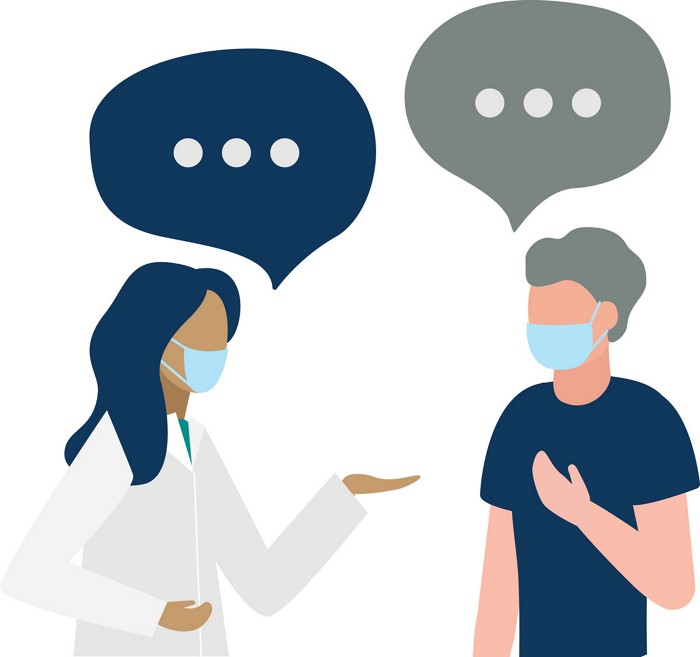
Credit: C&EN/Shutterstock
Scientists can help stop the spread of misinformation.
Living through a pandemic has resulted in phrases like RT-PCR, immune response, and aerosolized droplets becoming part of the regular vocabulary for a portion of the population. It has also underscored the important role that we all have to play as scientists in communicating science to the public. As research related to COVID-19 has moved forward at unprecedented rates, misinformation has also multiplied and spread at a terrifying pace. And no matter where you stand politically, all of this happening in an election year for the US further underscores the ways in which science has become an increasingly partisan issue.
Did I mention that the holidays are also approaching? While gatherings of family and friends may look different this year, you may still be anticipating a challenging conversation over a holiday meal with someone who has different viewpoints from yours.
Our situation comes with innumerable challenges. However, it also provides an opportunity for scientists to make a powerful contribution to society and demonstrate the value of science education. Whether or not you are engaging in research directly related to COVID-19, you can help those around you separate facts from myths, interpret the data that are available, and make better-informed decisions.
This realization occurred to me this spring. As positive cases of COVID-19 were just starting to appear in the US, I found myself talking to my physical therapist about the virus and potential treatments. Although I don’t work in drug development, I understand enough of the chemistry to know how nucleoside analogs such as the drug remdesivir function. I excitedly explained how viruses are sloppier than normal human cells when replicating their genomes and how researchers can capitalize on this to make drugs. A few days later, I found myself having a similar conversation with my mom. I wasn’t in a place to predict the efficacy of any drug, but I could at least explain why antivirals like remdesivir had a shot at working, while hydroxychloroquine was less promising. After these two conversations, it struck me that I could also share this knowledge with a broader population on social media.
Science communication is a skill that takes practice to develop, and I am still learning and growing. The stakes couldn’t be higher, but the important part is that any scientist can build this capability to communicate effectively.
A good first step in science communication is understanding your audience. Recognize that people who have limited science knowledge aren’t any less smart than you; they just have expertise in different areas. Approach each conversation assuming that the person you are talking with is curious and wants to learn. You may be proven wrong, but you’re unlikely to be heard by anyone if you don’t start from this place of mutual respect.
Think about what your audience knows, and start there. Explaining a scientific concept is a bit like climbing a ladder—you can move from simple to more complex, but you can’t bring anyone with you if they can’t grasp the first rung. Analogies can be a particularly effective way to provide that first rung. If you can relate the science you are about to explain to something that people already know about, they are more likely to understand and to want to learn more.
It’s also important to think about what is most critical for people to understand and what is not necessary. For example, you can help someone understand how an antiviral drug works without diving into the details of polyacrylamide gel electrophoresis images and crystal structures.
Another important step is to own your expertise. You may feel hesitant to talk about a topic that doesn’t perfectly align with your specific area of research specialization. However, it’s important to recognize that even if you work in an adjacent field, you have access to much more information on the topic than does most of the public. Additionally, you have expertise in how to find reliable information. In areas where you’re not equipped to interpret the primary scientific literature on a topic, you know how to access a commentary or perspective article in a reputable scientific journal, read and digest that, and then share the information with others. And it’s OK to not have all the answers. Even if you can only partially explain something before you hit the limit of your understanding, you are likely to be able to help someone gain more accurate information than they would get from a potentially dubious rumor on social media.
Above all, remember that every conversation matters. Whether you have a big stage or you’re having a casual chat over your next holiday dinner, you can have a huge impact on the lives of those around you.
Jen Heemstra is an associate professor of chemistry at Emory University who shares advice on Twitter at @jenheemstra. Find all her columns for C&EN and ask her questions at cenm.ag/officehours.
Views expressed are those of the author and not necessarily those of C&EN or ACS..
Chemical & Engineering News
ISSN 0009-2347
Copyright © 2020 American Chemical Society
Advertisement
"do it" - Google News
November 04, 2020 at 08:24PM
https://ift.tt/2GtMvrN
We're all science communicators. Here's how to do it better - Chemical & Engineering News
"do it" - Google News
https://ift.tt/2zLpFrJ
https://ift.tt/3feNbO7
Bagikan Berita Ini














0 Response to "We're all science communicators. Here's how to do it better - Chemical & Engineering News"
Post a Comment